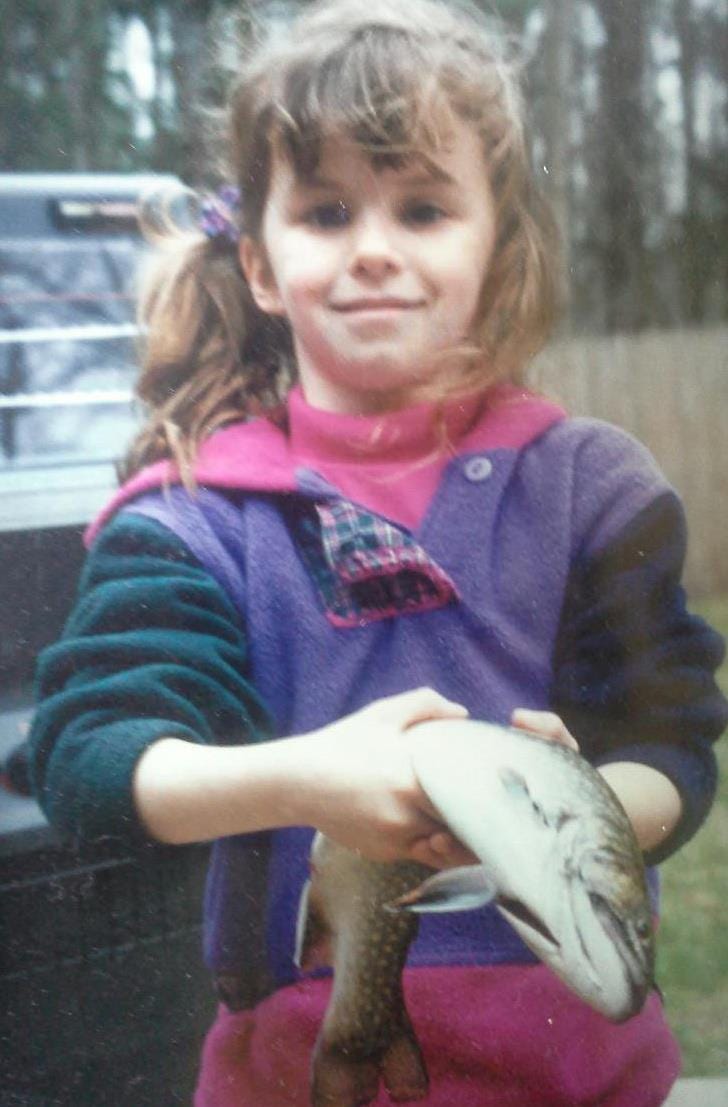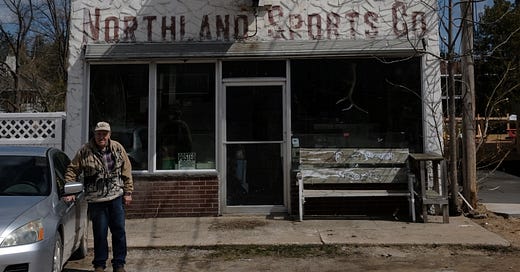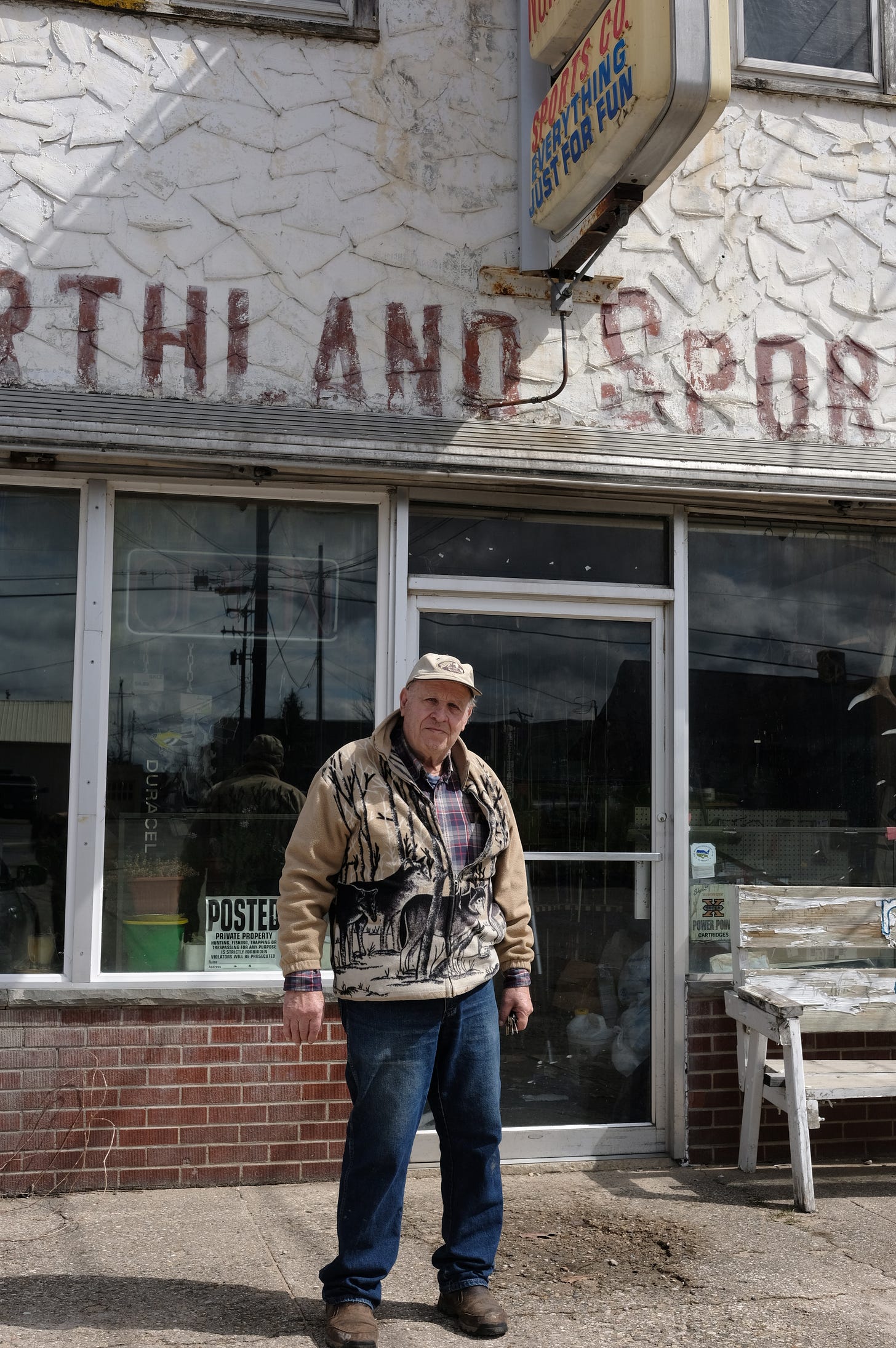It’s the evening before the trout and walleye seasons open, and I am at the Brass Rail in Indian River, Michigan, a veritable mecca for a certain breed of spin reel die-hards.
I arrive at 10:45 pm to find the bar full of men in jeans and hoodies, nearly all emblazoned with the formulaic naming convention of many a rural small business: (Last Name) (Electric/Tree Service/Construction/Plumbing). American flag on the shoulder. Relevant clip art. Those who weren’t in (insert trade here) hoodies wore camo or windbreakers, or camo windbreakers. Scruffy facial hair and work boots. Miller lights and whiskey shots. Copperhead Road on the jukebox. Not a woman in sight, aside from the bartender and the group I was with.
I quickly ran into a friend’s dad who I hadn't seen in years, who informed me of the occasion for the homogenous clientele this evening, which for being so excessively male was also more subdued than what I’d come to expect from this many men gathered at the Brass Rail at 11 pm. The occasion? Walleye opener. That is, not the trout opener—I know a trout fisherman when I see one, and these boys weren’t it. The two openers fall on the same day but you can tell from the back pocket chew can patina, square-toed boots and the specific wash of denim that this was a walleye crowd. Little do I know, their boats are already in the water and the subdued energy is largely a circumstance of their plans for the evening: to be on the water and fishing at exactly midnight. My friend’s dad—always the go-to host for Friday Night Fish Fry when I was a kid—quite literally guffawed at me when I asked him if they were prepping to fish the next day. “What you talking about? We’re heading out in an hour!”
It’s no wonder that the Brass Rail is the place to be on Walleye Eve—the walls are lined with an assortment of taxidermied brown trout and walleye, old fishing gear, mid-century Field and Stream covers and taxonomic illustrations of Michigan’s native fish. College flags and those cheeky signs you get at the gas station are sprinkled throughout, but the fish stuff is clearly the central vibe. I get a Two Hearted Ale at the bar—with a trout on the label and its namesake Hemingway story, it felt like the second most festive beer choice tonight, behind Miller Light. Tonya, one of maybe three bartenders I have ever seen behind the bar at the Brass Rail in the 25 or so years I’ve been coming here (my mom would often bring me here for dinner as a kid), hands me the bottle as I observe the crowd, very few of whom I recognize beside the group of dads I’ve known since childhood. This is telling—this is the kind of place where you know everyone, or at least someone in your group knows everyone that you don’t know. The crew I’m with are Rail regulars, and they’ve got this crowd nailed almost immediately—out-of-towners.
The bar clears out at exactly 11:30, when one group decides it's time to leave, making the rest of the men notably uneasy before they throw back the rest of their beers and head out the door, too. With the bar now void of the overbearing presence of anxious fishermen, the group of girls I’m with start taking up space—someone puts Pink Pony Club on the jukebox and the rumble of voices and occasional shouts becomes less soprano, more alto.
Tonight started as a simple euchre night at a friend’s house with no expectation to go out, but get one or two whiskey cokes on board and the Rail starts looking awfully alluring. I didn’t intend to be at the Rail on Walleye Eve, but I admit it was a funny way to ring in what is legitimately more of a recognized holiday in my hometown than most occasions—second only to opening day of deer season (rifle) as far as local hook and bullet holidays go, and probably at least on par with Easter as far as normal holidays are concerned.
I woke up the next morning not quite hungover but in that sort of liminal state where you feel like you should be hungover but are really just tired and kind of braindead. I texted my oldest sister and her friends—who I’d been hanging out with the night before—and we decided to grab coffee in town. We hovered over our drinks and recounted the previous night’s events, wherein another friend of ours pulled off a characteristic French exit at 2 a.m. before ending up at the Pinehurst—a dilapidated dive bar a short walk from the Rail, where that phrase “nothing good happens after midnight” probably originated. A constant stream of fishing boats buzzed by the windows of the cafe on trailers. After a bit, one of the girls said her dad just texted her and was fishing the creek within view of the coffee shop. We elect to go say hi.
We find him fishing for trout with a spinner, his jeans tucked into muck boots to avoid the high water. I’m told he has cancer but his energy suggests otherwise. The creek he’s fishing was rerouted about a century ago, now filtering slowly through a deep, dredged channel that was not part of its original course. As such, the water is soft, barely indicating any downstream flow. As a kid, my friends and I waded into this soft section of the river to catch crawfish in our bathing suits. I also caught a lifer trout in this mucky-ass side channel, a 20+ inch fish caught on a worm in my uncle’s backyard, just upstream, in about 1998.

The water is high and jet black, a result (I believe) of the magnetite that stains sand black in this part of the world, and it laps softly at the old wood pilings that are normally a foot or more out of the water. There’s some ribbing between our friend’s dad and her—she was supposed to be fishing with her cousins but went to bed at 3:30 am and thus wasn’t prepared to sit in a canoe navigating an ungodly amount of downed trees this early in the day. Her dad provides a first-hand report of the conditions on the nearby Black River (aptly named for the reasons outlined above), which he blankly states is not worth the effort.
No further elaboration is really needed. A recent ice storm devastated this area, and while it barely made the national news, it left over 300,000 people without power for up to 20 days in places. Entire power grids had to be rebuilt, as 1.5 inches of ice tend to devastate utility lines. It also, as you can imagine, laid waste in the forests—leaving significant portions of the spindly white pine without tops, while many mature trees fell whole from the excessive weight of ice in their broad canopies. This has resulted in rivers choked with trees—rivers that, by almost any account, were already choked with trees. Rivers that were previously navigable only through sheer grit, relentless portages and an early resignation that you’d be covered in spiders and ticks by the end of the day were now completely, entirely, unnavigable. In the Indian River Facebook group, people lamented the loss of access to trails and state parks, but outright mourned the loss of access to the rivers. “Who is going to clean this stuff up!?” Many have asked. “The DNR should be responsible, they don’t do nothing around here!” “The business owners who use the river should be responsible!” “Maybe we ought to try to clean it up ourselves?”
Our friend’s dad seemed immensely content here on the bank, fishing for trout in a few inches of standing brown water. I’ll admit that if I saw him on the street I’d take him for a walleye fisherman based on my aforementioned assessment criteria, which reminds me to not judge a book by its cover, as it were.
The girls stick around to chat with him, while I head out to speak with the guy who has owned the hunting and fishing store in town since the early 1960s. I’d set the conversation up earlier in the week, the most recent in my long line of random oral history side projects, which are my strange idea of “fun”. Roger (the owner) was extremely skeptical of my request at first, but finally acquiesced—his skepticism slowly transitioning to confusion over why I was so interested in what he had to say. I also didn’t realize I had set our meeting up on the morning of walleye opener, which seems like a bad time to meet with a guy who’s been fishing this waterway since the 50s, but Roger was unphased.
I walked over from the creek in town (yes, just about everything in “downtown” Indian River is less than a five-minute walk away) to find him leaning against his car outside the store. I said good morning and immediately questioned why he wasn’t fishing the opener. “First opener I’ve missed in 70-some years,” he said. “Ain’t really no fish out there right now, I’ve been checking.”
Since he lives above the shop in an apartment overlooking the river, Roger has a birds-eye view of what’s happening in the river that connects Burt Lake (to the west) and Mullett Lake (to the east). He mentions having shined for fish a few times over the last week to check on numbers, which were clearly not up to snuff for him. The weather further validated his hunch that this wouldn’t be a great opener. The morning was sunny with passing clouds, but fairly cold—upper 30s. There hadn’t been much rain recently. I attempted to engage on the rain thing from my perspective as an extremely amateur salmon and steelhead fisherman in the PNW, saying something to the effect of “More rain would kind of get them moving around, right?” Wrong, according to Roger. He doesn’t explain himself, resigning instead to say “It’s just not going to be a very good year,” a sentiment laced with that distinct air of knowing a place and river so well that you can’t quite put certain hunches to words.
Roger went out of business during Covid, but the store looked the same as I remembered—a tall, white stucco-ish building, with the fading words NORTHLAND SPORTS CO painted in red. Below that, a list of inventory—FISHING TACKLE, GUNS, ARCHERY, LIVE BAIT in alternating red and green. The view through the front windows was a veritable sea of vintage fishing gear and, well, a good bit of junk. Roger said as much when I asked to go inside, citing the junk while refusing my request. When I asked again later, with a bit more of a “pretty please” vibe, he gave me a straight “no” with little further explanation. From my viewpoint, I could see an elk shed hanging in the window above an old fishing net, with wooden duck decoys just beyond. There were piles of dusty boxes, interspersed with old rods, fading maps, random piles of lures. I told him to please let me know the second he’s considering selling any of this stuff. He grumbled, which I took as an “okay”.
Much like the interior that I could see through the dusty window, the building itself is in somewhat obvious disrepair, but it was also built in 1880 and is one of the few original buildings in town, particularly on this block; in fact, the building to the west was recently bulldozed for (rumored) condos, while the two parcels to the east are under an intensive remodel, which was supposed to be finished this week but is clearly behind, to the chagrin of many locals in the Indian River Facebook group. Construction workers scurry about, their shouts and power tools echoing through the empty, behemoth structure that was the former Inn Between, a longtime Indian River fixture where I worked for a few summers as a busser and barback, paid under the table and often asked by old, drunk patrons to “leg wrestle” with them, as leg wrestling with employees was advertised on the menu.
Named for its location smack dab between Burt and Mullett Lakes, the Inn Between is one of three points on the Bermuda Triangle of dive bars in my hometown, with the Brass Rail and the Pinehurst (I am begging you to click that link) making up the other two. Much like the owner of the nearby Pinehurst—which was built in the late 1800s and inhabits a couple hundred feet of prime real estate on the Indian River—Roger has refused to sell his property to the many folks who have come by making increasingly enticing offers, hoping to capitalize on the stellar river location that is also close to the core of town. He’s quick to wave off the offers and any suggestion of him selling, cause he don’t give a damn how much anyone offers, he ain’t going anywhere. I respect him for that, especially considering he’s owned the business since he was 21. It’s all he’s ever known, and I wouldn’t sell either.
The rest of the hungover girl crew eventually wanders over from the creek to chat with Roger, too—a funny scene, I have to admit: four women, 23-34 years old, still in their outfits from the bar the night before, mascara stains under eyes, sipping iced coffees and talking about musky numbers and walleye stocking in the neighboring lakes. Kate, the one who was supposed to be fishing with her cousins this morning, chats Roger up about the perch and pike she caught ice fishing over the winter. Roger brings up how much he hates the DNR’s lack of a stocking program in the lakes around here—a common callback during our conversation. Upon further research, the last walleye stocking in Burt Lake was in 1993, and 2014 in Mullett Lake. Not enough to keep numbers up, apparently. Now it’s all just splake, a stocked hybrid of brook and lake trout. Kate and Roger agree there’s been too heavy a focus on the splake fishery and not enough on the walleye. Some say splake are tasty, but Roger insists all trout are bad eating (I disagree with him on this, though I’d be happy to never eat a lake trout again) but says perch, walleye and bluegill are the best (I agree with him on this).
Eventually we say goodbye to Roger and go our respective ways. I wait for a string of snazzy walleye boats to pass before I cross the street—their expensive engines and rod holders and intense graphics buzzing by, hypnotizing me briefly. I wonder where they’re going. I wonder why they aren’t on the water at 10:30 am on the morning of opener. I wonder if Roger’s hunch was correct—did they have much luck? Did they watch the sunrise and feel the cool breeze that carries across the lake in the early morning hours? Did they find a moment of peace between their Miller Lights and the frenzied efforts to fill their coolers? Did they get what they came all this way for?




“Did they get what they came all this way for?” is pure poetry. Great piece!
i clicked the link! it was worth it!